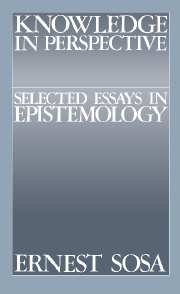Book contents
- Frontmatter
- Contents
- Sources and acknowledgments
- Introduction: back to basics
- PART I WHAT IS KNOWLEDGE, AND HOW IS IT POSSIBLE?
- PART II THEORIES OF JUSTIFICATION
- PART III INTELLECTUAL VIRTUE AND EPISTEMIC PERSPECTIVE: A VIEW PRESENTED
- 9 The foundations of foundationalism
- 10 The raft and the pyramid: coherence versus foundations in the theory of knowledge
- 11 The coherence of virtue and the virtue of coherence
- 12 Testimony and coherence
- PART IV INTELLECTUAL VIRTUE IN PERSPECTIVE: THE VIEW DEVELOPED
- Index
10 - The raft and the pyramid: coherence versus foundations in the theory of knowledge
Published online by Cambridge University Press: 08 January 2010
- Frontmatter
- Contents
- Sources and acknowledgments
- Introduction: back to basics
- PART I WHAT IS KNOWLEDGE, AND HOW IS IT POSSIBLE?
- PART II THEORIES OF JUSTIFICATION
- PART III INTELLECTUAL VIRTUE AND EPISTEMIC PERSPECTIVE: A VIEW PRESENTED
- 9 The foundations of foundationalism
- 10 The raft and the pyramid: coherence versus foundations in the theory of knowledge
- 11 The coherence of virtue and the virtue of coherence
- 12 Testimony and coherence
- PART IV INTELLECTUAL VIRTUE IN PERSPECTIVE: THE VIEW DEVELOPED
- Index
Summary
Contemporary epistemology must choose between the solid security of the ancient foundationalist pyramid and the risky adventure of the new coherentist raft. Our main objective will be to understand, as deeply as we can, the nature of the controversy and the reasons for and against each of the two options. But first of all we take note of two underlying assumptions.
TWO ASSUMPTIONS
(A1) Not everything believed is known, but nothing can be known without being at least believed (or accepted, presumed, taken for granted, or the like) in some broad sense. What additional requirements must a belief fill in order to be knowledge? There are surely at least the following two: (a) it must be true, and (b) it must be justified (or warranted, reasonable, correct, or the like).
(A2) Let us assume, moreover, with respect to the second condition A1(b): first, that it involves a normative or evaluative property; and, second, that the relevant sort of justification is that which pertains to knowledge: epistemic (or theoretical) justification. Someone seriously ill may have two sorts of justification for believing he will recover: the practical justification that derives from the contribution such belief will make to his recovery and the theoretical justification provided by the lab results, the doctor's diagnosis and prognosis, and so on. Only the latter is relevant to the question whether he knows.
- Type
- Chapter
- Information
- Knowledge in PerspectiveSelected Essays in Epistemology, pp. 165 - 191Publisher: Cambridge University PressPrint publication year: 1991
- 10
- Cited by



